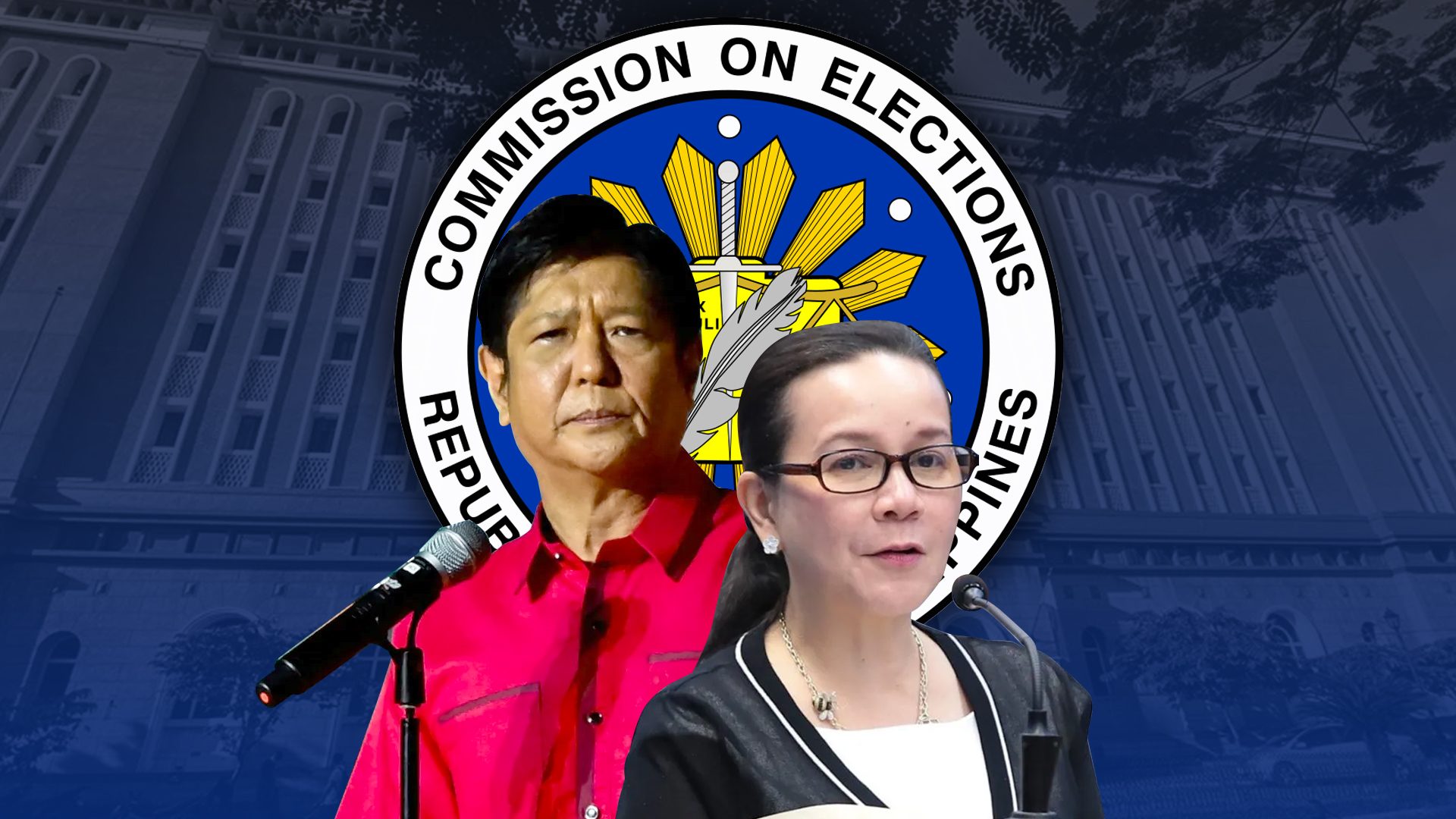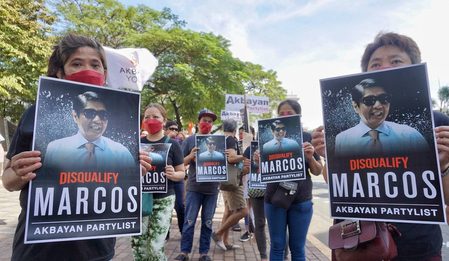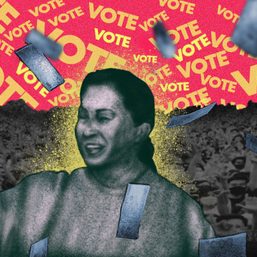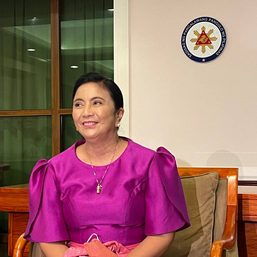SUMMARY
This is AI generated summarization, which may have errors. For context, always refer to the full article.

MANILA, Philippines – The much-awaited ruling on the consolidated disqualification petitions against 2022 presidential aspirant Ferdinand Marcos Jr. has finally come out. But don’t let it confuse you: the Commission on Elections (Comelec) is not yet done dealing with the disqualification saga concerning the son and namesake of the ousted dictator.
That’s because the consolidated case has only been resolved at the division level, and the dismissal order is still appealable with the Comelec en banc or the full commission.
In fact, two other petitions against Marcos Jr.’s candidacy, which were junked at the division level, are still the subject of en banc reviews, as of this writing.
So what’s taking it so long? For one, the Comelec has described Marcos Jr.’s presidential bid as the most contested in recent memory. The petitions against him outnumber those filed against Senator Grace Poe, also a presidential frontrunner six years ago.
Speedy verdict on anti-Poe cases
The Comelec’s speedy verdict on the cases against Poe in the 2016 elections underscores the slow resolution of the petitions against Marcos Jr. in 2022.
For the 2016 elections, the Comelec received its first petition seeking to block Poe’s presidential bid on October 16, 2015, a day after she filed her candidacy papers. She eventually faced three more cases.
By December 11, or 56 days from October 16, all cases had been resolved at the division level. On December 23, the Comelec en banc had cleared its desks of anti-Poe petitions.
Before that year ended, and before the campaign period even started in February 2016, Poe’s disqualification brouhaha was already another institution’s problem – the Supreme Court. By March, the magistrates had concluded that Poe was allowed to run for president.

Anti-Marcos cases at snail’s pace
In comparson, the Comelec now appears to be taking its time in resolving the petitions against Marcos Jr.
As of Friday, February 11 – three days after the campaign period started – four cases have not been fully resolved, namely:
- Lihaylihay vs Marcos – junked by the Comelec 2nd Division, subject to en banc review
- Buenafe et al vs Marcos – junked by the 2nd Division, subject to en banc review
- Ilagan et al vs Marcos, Akbayan et al vs Marcos, Mangelen vs Marcos (consolidated) – junked by the 1st Division, but petitioners plan to appeal before the en banc
- Salandanan et al vs Marcos – pending with the 2nd Division
The Lihaylihay case – a petition to declare Marcos Jr. a nuisance candidate – was filed by Comelec-declared nuisance presidential aspirant Danilo Lihaylihay on October 12, 2021, six days after the former senator submitted his candidacy papers. It was the first petition against Marcos Jr.’s candidacy.
But the Comelec’s 2nd Division only ruled on his petition – junking it – on December 16. Lihaylihay filed an appeal on December 22, but he claimed that the 2nd Division elevated the motion for reconsideration to the en banc only on January 27, 2022, or 36 days later.
“It could have been done in one day only,” Lihaylihay said in a statement sent by his camp to Rappler on January 28, lamenting what he described as “highly irregular” pace of the process.
The 1993 Comelec Rules of Procedures gives the clerk of court 24 hours from the filing of an appeal to notify the presiding commissioner in a division, who has then two days to certify the case for the en banc.
Former Supreme Court spokesman Ted Te, lawyer of the petitioners in the Buenafe case, said their motion for partial reconsideration was elevated to the en banc also on January 27, or “within the three-day period provided by the Rules,” he said. They filed their appeal on January 24.
In 2016, the full Comelec had completely cleared their desks of anti-Poe cases after 68 days, the poll body in 2022 still has a pending case with a division (Salandanan et al vs Marcos) as of this writing – or 125 days since it received this first anti-Marcos petition.

15-day rule not followed
The slow resolution of the anti-Marcos cases became much more noticeable in January, when then-commissioner Rowena Guanzon, about to retire, accused her younger colleague Aimee Ferolino of deliberately delaying the release of the ruling, so that Guanzon’s vote to disqualify Marcos Jr. would not be counted.
Guanzon was insistent that Ferolino should have followed a supposed 15-day deadline.

Comelec Resolution No. 7808, a copy of which was obtained by Rappler, amended Rule 18, Section 1 of the 1993 Comelec Rules to this effect: “The ponente shall prepare the decision within 15 days from the last date of deliberation, and shall forthwith furnish all the other commissioners copies of the draft for their review.”
“Any separate opinion, concurring or dissenting opinion shall be submitted within seven days from receipt of a copy of the draft resolution. In case a dissenting opinion is subsequently adopted by the majority the dissenters shall decide who shall write the new majority opinion, while the original ponencia becomes the dissenting opinion,” the 2007 document added.
Ferolino’s office had said the consolidated anti-Marcos cases filed by party-list group Akbayan, Martial Law survivors, and former Partido Federal ng Pilipinas officers were only deemed submitted for resolution on January 14. A dismissal order came out on February 10, or 27 days later.
Ferolino’s camp had argued there was no delay, and that the prolonged release of the ruling was due to a number of factors: COVID-19 cases in her office, and the complexity of having to resolve three cases combined.
Asked in general about the internal rules on promulgation of cases that govern the divisions at the poll body, Comelec Spokesman James Jimenez on February 3 said, “It’s directory, not mandatory.”

Election lawyer Emil Marañon III, who was once the chief-of-staff of the late former Comelec chairman Sixto Brillantes Jr., shared that opinion. He said it is “discretionary” on the part of the commissioners to follow internal rules on the promulgation of cases.
“There are many realities. The work of a commissioner piles up. One, on the administrative part, because they are preparing for the elections, and a lot of en banc matters are being decided by all the commissioners plus the chairman, so they attend meetings all the time. Second, the volume of cases assigned to each commissioner,” Marañon told Rappler in a mix of English and Filipino on February 1.
Comelec insiders and people closely following developments within the poll body would know that there have been many instances where a case did not get resolved only within 15 days.
The 2nd Division led by Commissioner Socorro Inting, for instance, released a ruling on the Buenafe case against Marcos only on January 17, or nearly a month after the case was considered deemed for resolution in the division.
Petitions vs Poe, Marcos ‘not comparable’
But for the Comelec’s spokesman, there’s no point in comparing the poll body’s Marcos episode now with that of Poe in the 2016 elections.
“You can’t compare how things were resolved in one case six years ago to how a case is being resolved now. Number two, you cannot compare cases where issues are different,” Jimenez told Rappler in a press briefing on February 11.
The petitions against Poe tackled issues on her citizenship and residency; cases against Marcos Jr.’s candidacy centered on his tax conviction in the 1990s.
But asked whether the cases against Marcos Jr. are the most intricate the Comelec has tackled among presidential aspirants, Jimenez said “not necessarily.”
“The complexity of the case is a factor, but I won’t go as far as to say as this is the most complex case we’ve ever had. Or that it is more complex than, in your example, a citizenship question. That was very complex…. One of the issue there was, what is the citizenship of a foundling,” Jimenez noted.

Former Comelec commissioner Luie Guia, who was part of the Comelec during the Poe disqualification saga, said that, despite internal rifts at the time, “there was a consensus” that the cases had to be resolved as soon as possible.
“[Former] Comelec chairman Andy Bautista and all of us said, ‘Let’s prioritize this and finish this, so that it’s over.’ What I did, in my office, my staff were all hands on deck,” he recalled in a conversation with Rappler on January 30.
“We were able to finish it in such a way that we were able to give whoever will run to the Supreme Court enough time [to make an appeal],” he said.
This time, the pending status of the Marcos cases hangs over the Comelec as it prepares for the 2022 polls. It has become a constant source of frustration among critics who are doubting the poll body’s credibility.
The prolonged release of the ruling also opens the floodgates to multiple scenario-building, especially as the campaign period began on February 8, such as what would happen if Marcos Jr. is disqualified before election day, or wins in the polls but is then disqualified by final judgment after he is proclaimed president.
“They have to consider it is a matter of public interest, because people are watching,” Marañon said.
Even after the cases are decided in the Comelec, the game is not yet over. Like in 2016, all roads will lead to the Supreme Court to decide once and for all whether the presidential frontrunner – Marcos Jr. – is qualified to run for the country’s top post. – Rappler.com
Add a comment
How does this make you feel?






![[Newspoint] Improbable vote](https://www.rappler.com/tachyon/2023/03/Newspoint-improbable-vote-March-24-2023.jpg?resize=257%2C257&crop=339px%2C0px%2C720px%2C720px)
![[Newspoint] 19 million reasons](https://www.rappler.com/tachyon/2022/12/Newspoint-19-million-reasons-December-31-2022.jpg?resize=257%2C257&crop=181px%2C0px%2C900px%2C900px)





![[New School] Tama na kayo](https://www.rappler.com/tachyon/2024/02/new-school-tama-na-kayo-feb-6-2024.jpg?resize=257%2C257&crop=290px%2C0px%2C720px%2C720px)
![[In This Economy] Marcos’ POGO ban is popular, but will it work?](https://www.rappler.com/tachyon/2024/07/thought-leaders-marcos-pogo-ban.jpg?resize=257%2C257&crop=255px%2C0px%2C720px%2C720px)
![[Rappler Investigates] POGOs no-go as Typhoon Carina exits](https://www.rappler.com/tachyon/2024/07/newsletter-graphics-carina-pogo.jpg?resize=257%2C257&crop=424px%2C0px%2C1080px%2C1080px)



There are no comments yet. Add your comment to start the conversation.